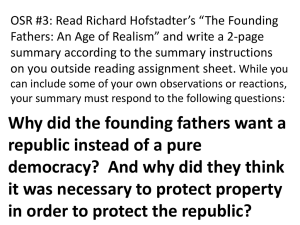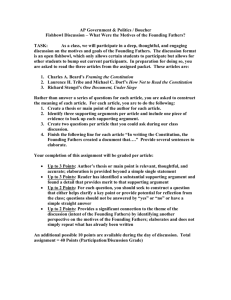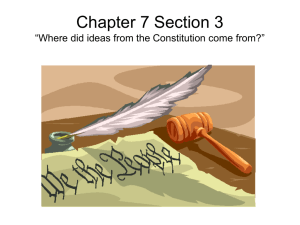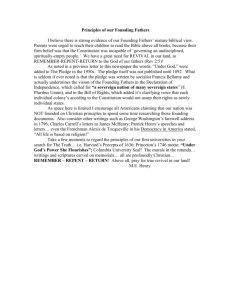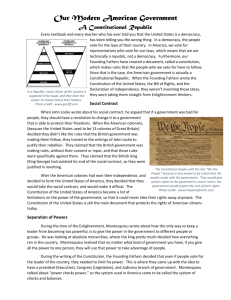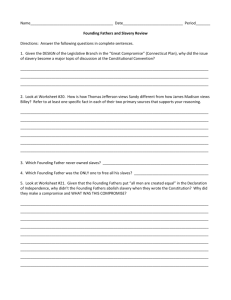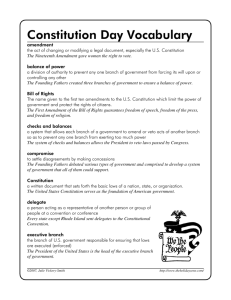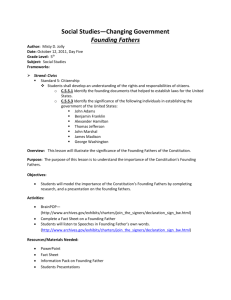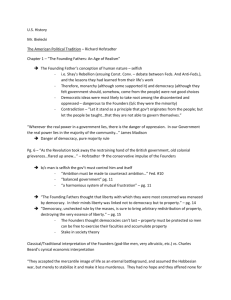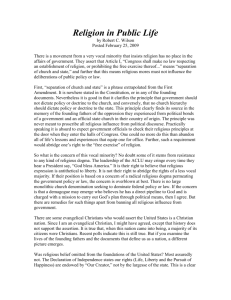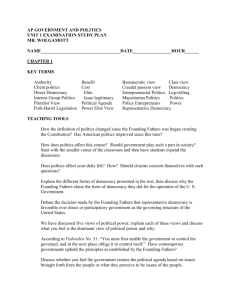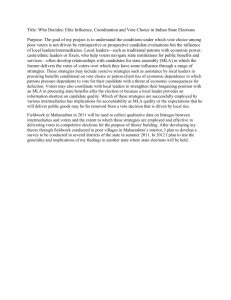Government Practice Test Questions
advertisement
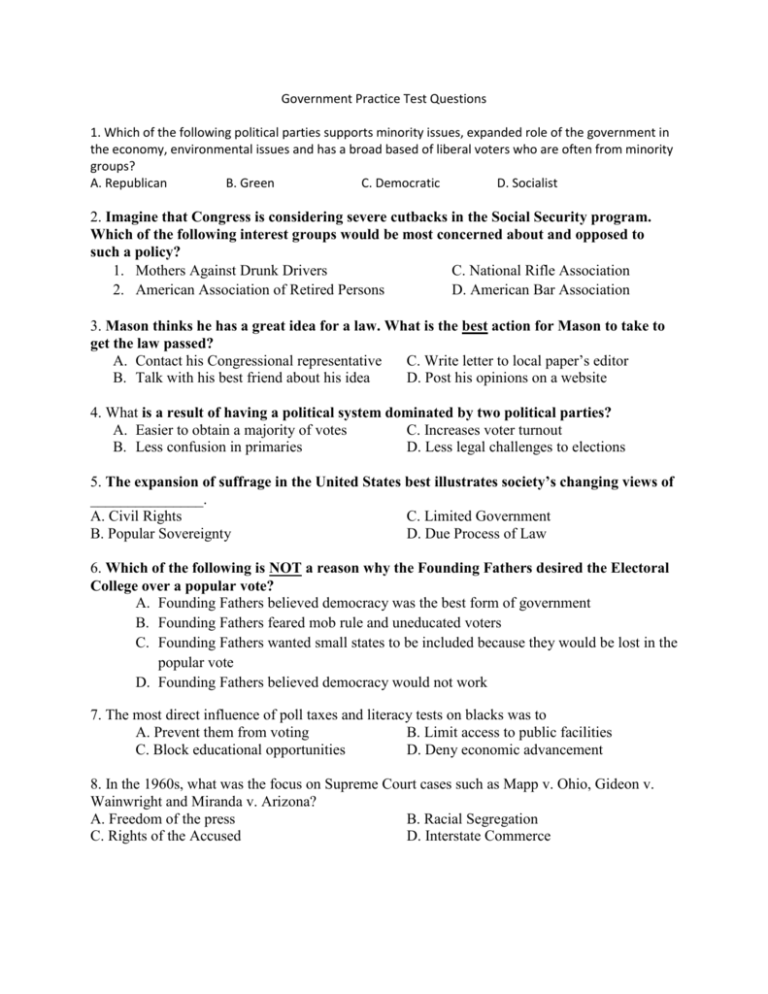
Government Practice Test Questions 1. Which of the following political parties supports minority issues, expanded role of the government in the economy, environmental issues and has a broad based of liberal voters who are often from minority groups? A. Republican B. Green C. Democratic D. Socialist 2. Imagine that Congress is considering severe cutbacks in the Social Security program. Which of the following interest groups would be most concerned about and opposed to such a policy? 1. Mothers Against Drunk Drivers C. National Rifle Association 2. American Association of Retired Persons D. American Bar Association 3. Mason thinks he has a great idea for a law. What is the best action for Mason to take to get the law passed? A. Contact his Congressional representative C. Write letter to local paper’s editor B. Talk with his best friend about his idea D. Post his opinions on a website 4. What is a result of having a political system dominated by two political parties? A. Easier to obtain a majority of votes C. Increases voter turnout B. Less confusion in primaries D. Less legal challenges to elections 5. The expansion of suffrage in the United States best illustrates society’s changing views of _______________. A. Civil Rights C. Limited Government B. Popular Sovereignty D. Due Process of Law 6. Which of the following is NOT a reason why the Founding Fathers desired the Electoral College over a popular vote? A. Founding Fathers believed democracy was the best form of government B. Founding Fathers feared mob rule and uneducated voters C. Founding Fathers wanted small states to be included because they would be lost in the popular vote D. Founding Fathers believed democracy would not work 7. The most direct influence of poll taxes and literacy tests on blacks was to A. Prevent them from voting B. Limit access to public facilities C. Block educational opportunities D. Deny economic advancement 8. In the 1960s, what was the focus on Supreme Court cases such as Mapp v. Ohio, Gideon v. Wainwright and Miranda v. Arizona? A. Freedom of the press B. Racial Segregation C. Rights of the Accused D. Interstate Commerce 9. Which statement best describes a function of interest group? A. Nomination of candidates for office B. Override Presidential actions by protests C. Advocate for citizens with similar ideas about issues D. Organize forums to raise money for causes 10. Which of the following answers provides a way to prevent a “tyranny of the majority?” A. Coalition governments and Dictatorships B. Absolute power and strong police force C. Supermajorities and inalienable rights D. Democracy and oppressive laws 11. Which of the following leadership styles is BEST described as a hands-off approach to leadership with minimal control and prefers to delegate most duties instead of micromanaging every detail. A. Authoritarian (Autocratic) B. Laissez-faire C. Democratic (Participative) D. None of the Above 12. Which of the following third parties in the United States can be described as an advocate of individual liberty, especially freedom of thought and action? A. Green B. Libertarian C. Socialist D. Constitution 13. Which of the following documents was the first limit on government and established protections/rights for people accused of a crime such writ of habeus corpus, trial by jury, right to speedy trial, no unreasonable search and seizure? A. Magna Carta B. Spartan Constitution C. Mayflower Compact D. English Bill of Rights 14. Which of the following describes a political lobby? A. a group that formulates political and policy agendas, selects candidates, and conducts election campaigns B. a committee of educators responsible for making recommendations to improve the political system C. the waiting area outside the voting chamber at the U.S. Capitol D. a group engaged in trying to influence legislators or other public officials in favor of a specific cause 15. The U.S. Constitution establishes a system by which power is shared between the national government and the state governments. However, if there is ever a conflict between a law passed by a state and one passed by the national government, which of the following is true? A. Courts will decide which of the two laws is supreme. B. The national legislature will have to change the laws. C. The law passed by the national government is supreme. D. Voters of the state will decide which law they prefer. 16. Powers that remain with the states after other powers were delegated to the national government by the Constitution are called which of the following? A. Reserved B. Concurrent C. Legislative D. Enumerated 17. Why was the Magna Carta, signed in 1215, historically significant to the development of democratic governments? A. The document established a new Parliamentary body to balance some of the King's powers in Great Britain. B. The document established the principle that no person is above the law and that the government must follow its own laws in its dealings with its citizens. C. The document was the first example of a group of citizens creating and agreeing to obey a representative form of government. D. The document was the first example of an English colony declaring its independence from the King. 18. Due process is the entitlement of a citizen to A. vote for representation in the national Congress B. proper legal procedures and natural justice. C. a public defender when the citizen is on trial. D. legal means of protest against a violation of rights. 19. The most important role of the Electoral College is to ________. A. Nominate candidate to Congress C. Settle national elections in case of a tie B. Vote for President and Vice President D. Educate voters prior to elections 20. Which activity of an interest group for teachers would have the most significant political impact? A. Providing legal advice for members who feel their rights have been violated B. Ensuring that continuing education is provided for experienced educators C. Providing instructors with lesson plans that align with curriculum D. Lobbying elected officials to enact new education laws
